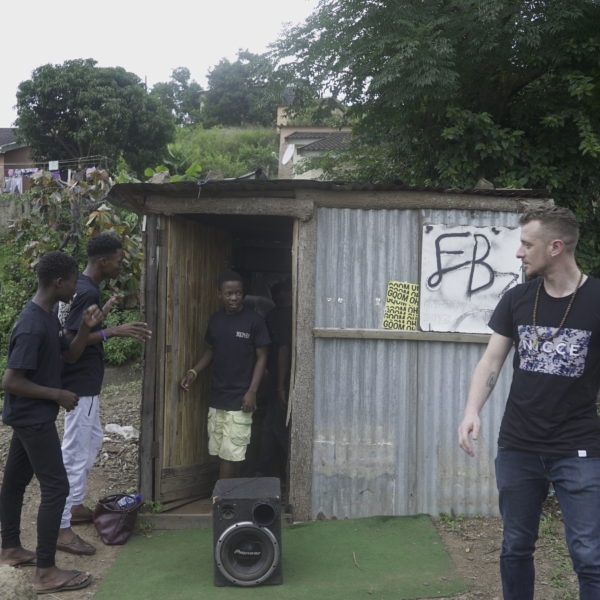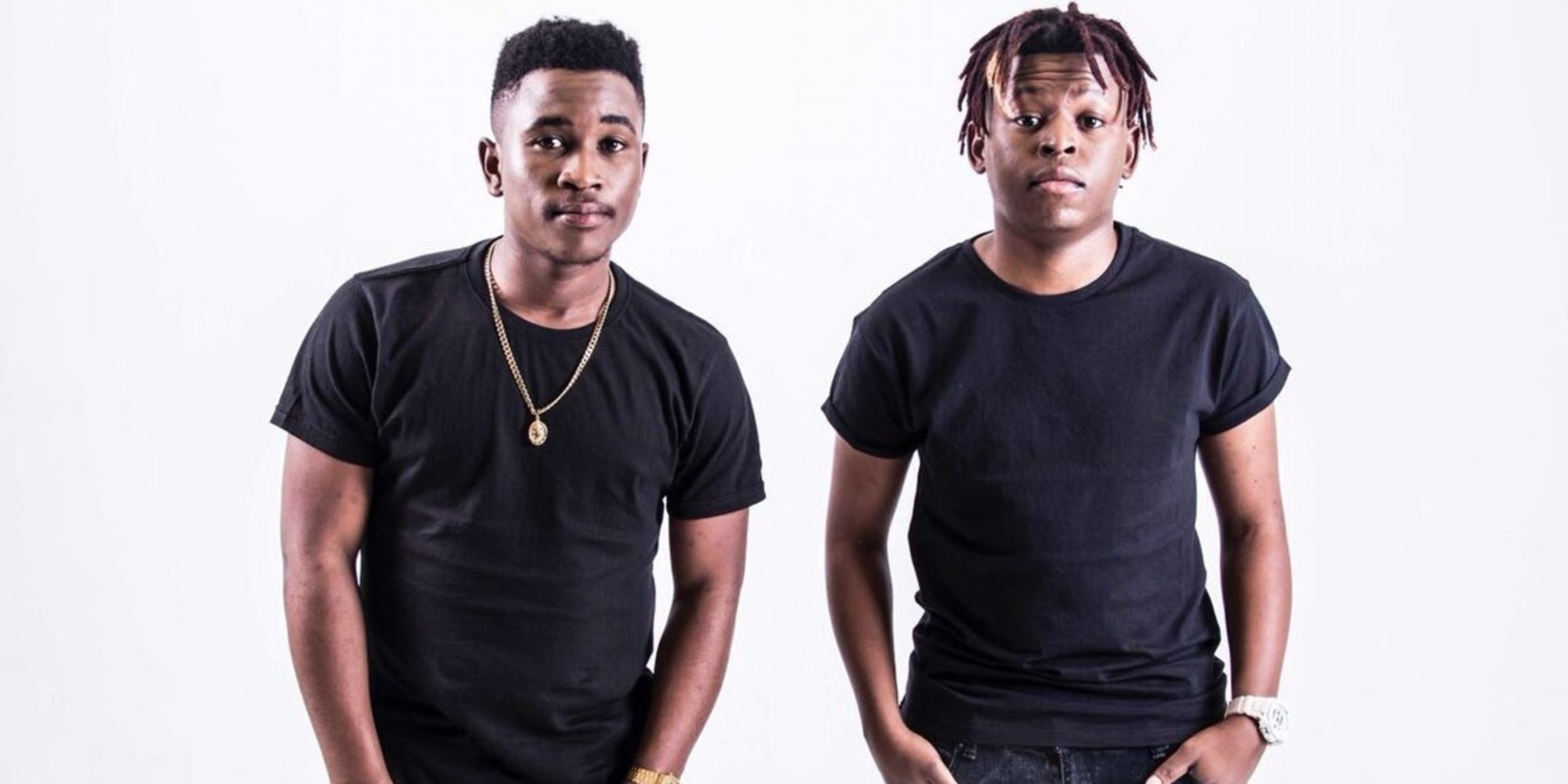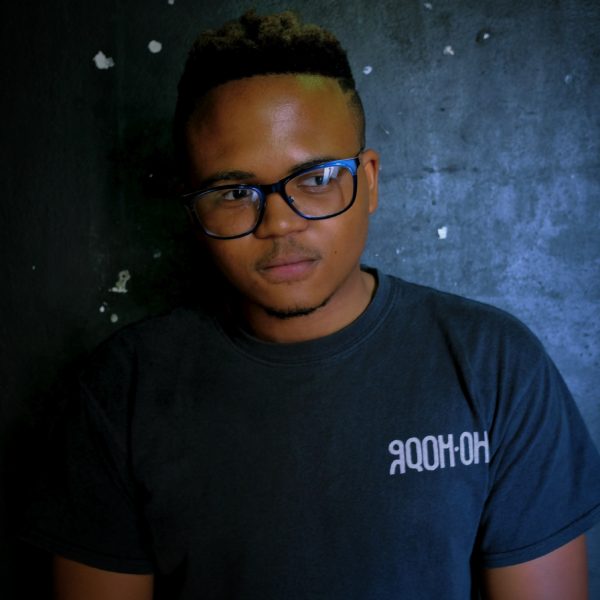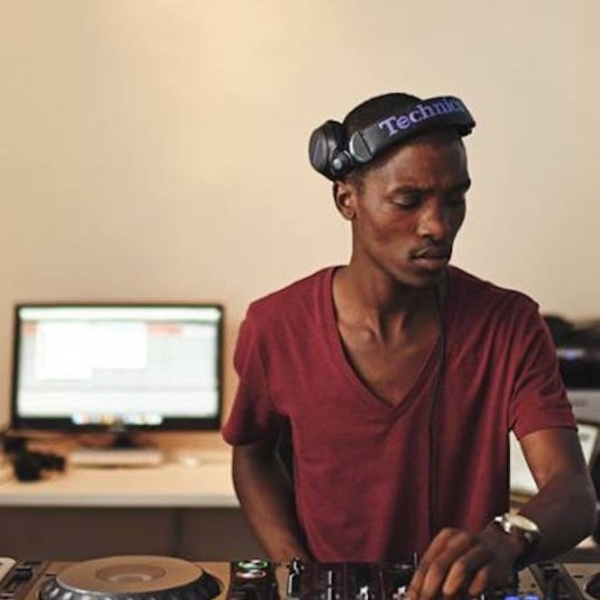It’s been quite the year for Distruction Boyz, a duo from Durban, South Africa made up of young producers Que and Zipho. They have been experiencing great momentum since 2016 when they produced the hit song “Wololo” for Babes Wodumo that turned gqom from an underground grunge-youth genre to radio-friendly pop music. This led them to release their debut album called Gqom Is the Future a year later; and in 2018, their songs have reached an international audience thanks to the immense success of the film Black Panther. “Wololo” was featured prominently in the film, and their hit song “Omunye” from their album became the soundtrack for viral “Black Panther dance challenge” videos.
Their success has drawn a lot of criticism from gqom producers, who claim that the sound of Distruction Boyz is too commercial. So much so that gqom producers no longer call their music gqom but rather sgubhu, which is the name for the lighter, more house-like sound. Que spoke to Afropop producer Akornefa Akyea about why he maintains that his music is gqom rather than sgubhu. He also discusses the success of “Omunye” and his experiences touring the globe.
Akornefa: When did you start producing gqom?
Que: It was around 2012.
That seems to be when a lot of the producers were starting at that time. Who were your influences?
It had to be guys that were before us. Your Griffit Vigos, your DJ Gukwa, your Rude Boyz… some of them are late. We all started around the same time and that was when the wave was kicking in.
When the wave was kicking in, were people to listening to it? What was it like back then?
It was cool. With every youth movement there’s always going to be some negative thing said about it. At first it was really hard for gqom to play on radio and get TV play. What we did with the genre was we made it more edible to the human ear. It was us taking the sound, cleaning it up a bit, putting it together, making it something solid and something that they can play the radio as well and not have sounds going astray. You know, everything going in order, perfect timing and pacing and stuff like that. I think that was the major breakthrough for gqom. We commercialized it. We did “Wololo" for Babes Wodumo and that was the major, major breakthrough for the gqom movement. But before that we did a lot of stuff like “Uzophuza Amanzi” and it kind of paved the way for your “Wololo”s and “Omunye”s and all the other songs that are coming now. We made it something one can jam to even on a Sunday morning, not just when you’re going to a party.
Got it. How do you feel about people calling your music sgubhu instead of gqom?
I think the perception is that the difference is vast when it’s really not. For me, I consider what I do to be gqom. It might not be something that Griffit Vigo or DJ Lag would produce but I still consider it very much gqom. We cleaned up the original sound because it was so hard to understand and learn about this sound. We did what we did to it so that other people could get a chance to shine. Because if we didn’t do that, by now I’m sure people would still be playing gqom only in taxis and it wouldn’t be on radio and TV commercials and stuff like that.
I see. Honestly, with the whole Black Panther craze, I definitely saw how more mainstream gqom has become here as a result of hearing “Wololo” in the movie. Then of course there was the viral “Black Panther” dance video with your song “Omunye.” Did you see that?
Yeah a lot of people have been sending me videos and stuff. It really excites me and it warms my heart to see people warming up to the sound. Because at the beginning, when we released our first album, we actually took out a statement and we told everyone what our dream was and what we wished to achieve with the album and it really warms my heart to see people actually making it a reality.
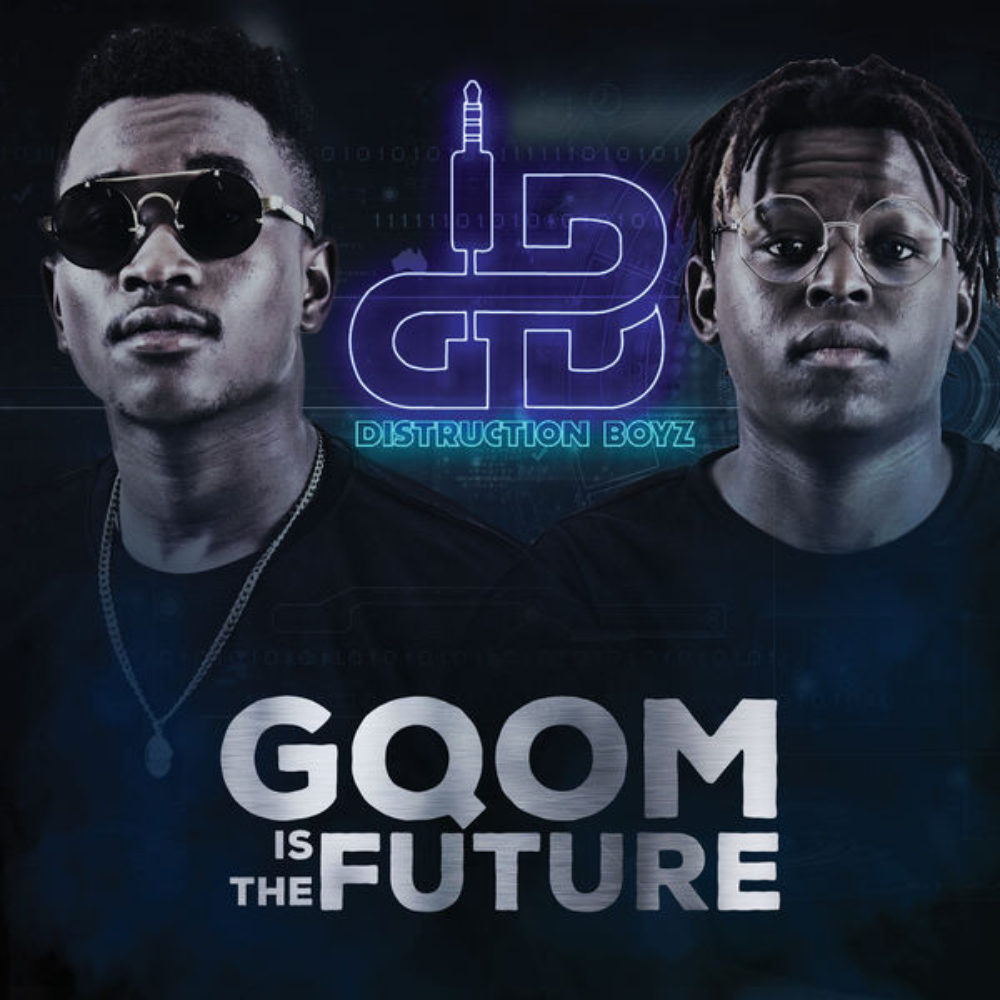
So when you went into making the album Gqom Is the Future your focus was to, like you said, “clean up the sound” correct?
Yeah. Even before the album came out, we had already cleaned it up the sound with “Wololo.”
“Wololo” came out in 2016?
Yeah, exactly.
I’m curious, do you play any instruments?
No, we do not play any instruments. Everything that we do, we’re self taught.
So the synth sounds are coming from your software?
Yeah.
Do you also use FruityLoops?
Yeah, we use FruityLoops. We’ve been using it for the longest time. When we started, it was the only software accessible to us because we come from really disadvantaged backgrounds. It was even hard to get a mere computer. You know?
Yeah, so even creating this “cleaned up” gqom sound, you were able to do that all on FruityLoops.
All on FruityLoops.
In terms of song structure, I’m listening to “Omunye,” and other gqom/sgubhu songs like “Makhe” and they all seem to start off with the introduction to the beat and then get into some samples and singing and then there’s this breakdown section where it gets lower and then it comes back up.
[Laughs].
Is there a structure to how you produce?
Back then, the structures were a bit all over the place. Like I told you, we created a structure. From all the songs we’ve been doing, we’ve been using the same structure and I think it took people quite a while to actually understand where our minds were at when we were making the music. I think we were a bit ahead of our time when we did this thing. It’s always about taking people to a very high place and then settling them down again so that they can understand what’s going on and then bringing them back to that high place again. It always has to be like that, you know? It’s not just one thing that keeps going up and never comes down. At some point it has to drop and then you’re done for! You’re wasted [Laughs]! It’s like that with music, therapy, anything. We do music to touch people’s hearts. Not just their minds or whatever. But actually go deep inside your heart and you start thinking about things. Because you know gqom is very dark.
It is dark! Is there a reason why it sounds so dark? Is there something about what people are experiencing that gets reflected into the music in that way?
With each and every youth of the world, there’s always people going through some problems of their own. With us it had to be finding something to eat at night, poverty. You know, all those problems going around in each and every society. So I think with us, doing what we did with the sound was a way for us to make moves, get food, to get money for our families to live. All the anger, all those emotions were bottled up inside, we actually took them out into the music and sold it so we could make a living. It’s all the problems that the youth of today are facing. That’s why the sound is so dark. It’s like, maybe if we were happy we’d probably be making jazz or something! We wouldn’t have time for gqom if we didn’t have all the problems that we have. I mean crime is also a big factor. It’s like that. We took our upbringing and put it in the song and magic came out.
Definitely! I’m so impressed and blown away with the innovation with not a lot of tools. You’re making music with FruityLoops and just a laptop and now it’s gone internationally which is amazing. And I think people can definitely connect to that emotional aspect. Even if they don’t know it, they’re connecting to the humanity that’s embedded in the music.
That’s why music is really an international language.
Absolutely. Where have you been touring lately?
The last couple of months we’ve been to so many places. We’ve been to Canada, Barcelona, the U.K., other African countries like Zimbabwe, Botswana, Namibia… we actually went to Namibia and got award for best pan-African artist. We also got another award in Nigeria for the best group at the Soundcity MVP International Awards. We were also nominated for the BET Awards for Best International Act. Yo, other awards are coming up as well. It’s looking pretty good. Hopefully we can pick another one for the gqom movement.
It is looking very good! How does your community feel about your success?
We are much, much appreciated. Going back home after such a long time and seeing all the people we grew up with all trying to make a living and then all of them saying that they’re proud of you actually touches your heart and it shows you anything is possible with God and love and communication, anything can be possible.
Are you planning to come to New York soon?
Um, yeah! Most definitely! America needs us. They need us. They should do something about that. They should bring us over for the whole month and we can just go around the country for the whole month sharing the music, you know?
I agree with you! So something that is very important in America, especially black American culture is dance. And definitely one of the ways that gqom has been able to translate has been through dancing. Through gwara gwara. Is bhenga the name of all of the dance moves?
It’s not the name of all the dance moves. But it’s the style of dance. Just like there’s ballet, contemporary, hip-hop. And then within that style there are different styles. Like ivosho, vuma, gwara gwara. Bhenga is the mother and then gwara gwara is like the baby and ivosho is like another baby.
I get it. So when you’re producing music, are you thinking about how people can dance to it?
When we’re performing, we see people’s highs and lows and we found a way to manipulate that in the way we pace our music from the first kick to the break to the toms to the high hat to the snares. We know when they want to jump high and when they want to duck. We know when they want to do ivosho. So we manipulate them and we allocate all our sounds in that particular order so that when they need to jump something needs to make them jump. Not just they jump and now the song is going sideways. Doesn’t make any sense. And when they want to ivosho and want to go in hard we come back with a heavy kick. Now they want to go in hard. So it’s manipulating people’s mindsets and movements according to the way they want to be. Because Durban has its own culture and its vibe, and when people say they want to go out and party they actually wanna go out and party. That’s why deep house isn’t very big in Durban because people don’t understand it. They want to dance, they want to ivosho, they want to gwara gwara. They can’t do that to a song that’s going 120 bpm. It has to be at 130 or 128 for you to be able to move. It’s us manipulating people’s mindsets and knowing when to put the right sound in.
It has to upbeat and it has to be fast.
Has to be! So if the song was at 130, we came and took it down a few paces. Maybe 128, 127 maybe 126. That’s when people started getting into the groove, we bring it up to 128 or even 130 because now they understand the groove. It takes people time to adjust. So we take it down a bit to maybe 126. Now that they’re caught up, we might as well just bring it up. We play around with the tempos with different songs.
I’ve been wondering this and you may not have the answer. but why do you think there are not as many women as gqom producers. When you’re talking about the circle, it’s mainly men. Do you have any idea why that is?
I’m not too sure. I probably think that as gqom producers, you start going out at night at a very young age. You start making music at a very young age. And us being from African families, they’re very conservative, you know? I think that’s just one of the major factors why there’s not as many women producers and DJs as there are men. Here in Africa, it’s different. It’s not like, when a girl is 16 and I’m 16 she can just go out into the world and do whatever. Here’s you’re still a child until leave the house and you get married. That’s when you grow up. So I think it’s that conservative nature that makes it so boys can say, “Mom, I need to go make money.” You can’t be telling me to stay in the house when I can find a means to make money. You want me to do crime or you want me to make music. It’s that choice. So it’s always easier for us boys to get access to clubs and stuff like that to perform and showcase our music but for girls it’s very different. It’s very difficult for them because they’re still treated as such. As girls.
But even so, there are definitely the gqom queens. But they’re not behind the music. they’re more in the forefront and singing over the tracks.
For them it’s more on the vocals and stuff like that. You only find a few gqom female producers and I can just count them on my hand. But I feel like their time is going to come as well because everyone’s time comes.
From your perspective having toured internationally, has there been something that surprised you in terms of how people are receiving the music?
Besides the culture shock I’ve been getting, a lot of people are welcoming the sound. They want to learn more. They want to actually find out what’s going on. And that’s good. They’re very inquisitive and actually curious to find out what’s going on. It’s good for us because we’re receiving a lot of attention and that’s going to push our work even to greater heights than they’re already at.
Also, since you’re from a very specific culture, how do you maintain your cultural identity in the music so that it doesn’t end up just sounding like another house song?
Yeah, I mean you have to keep that authenticity, you know. What we do is we always listen to the songs we used to make back then and we compare them to the songs we make now. We always trying to go back and find correlations to the songs that we did back then so we can keep that authenticity.
Let’s talk about “Omunye.” The ad-libs are great. Is that Benny Maverick?
Dlala Mshunqisi and Benny Maverick. Dlala Mshunqisi, is the big guy that sings and, he’s a super cool vocalist. Actually he was made for gqom. He’s done other projects outside of gqom and they’ve never been as big this gqom project. So he’s one to look out for as well. His ad-libs are so amazing! They just stick to the beat. It’s like, you make the beat to accommodate the ad-libs. He just came and he sat perfectly. He just jelled. It was one of those things. You just go “ye-ye, ye-ye” and it’s so easy for people to sing along. You don’t have to know any language. You just say “ye-ye, ye-ye!”
It’s just so fun! What does “Omunye” mean?
It means someone. “Omunye phezu komunye" means someone on top of someone.
Oh! Is this a sexual song?
No, it’s not. It actually speaks about a packed party. When you translate all the lyrics it says, “Why is it so full here?” There’s no movement. People are on top of other people because there’s no movement. It’s packed.
Oh!
Yeah, now you understand? In the video, you see me on top of somebody’s back and people are squashing me and people are jumping over walls to get into the party because that’s how packed it is.
Oh! So this is a lit party song!
[Laughs] Yeah! It is! But then people took it wherever they wanted to take it but it was cool. It worked for us. It worked in our favor as well. They actually wanted to ban it but when I explained it to the whole nation, then they understood and it was cool. Then they made it song of the year, then we went to the awards and we got record of the year awards.
O.K., so people thought, like I did, that it was a sexual song.
It was off the radio actually. And then we had to make a radio version of it that said “something on top of something” so it’s not like someone it’s something now.
I see. So they tried to make it more radio friendly.
Yeah [Laughs]. You know how old people are.
What do you hope for gqom in the future? Where do you want to see it go?
Yo, we still want to get it to all the four corners of the world. People are warming up to it but we feel like they haven’t heard the sounds enough to understand it. They’ve heard it and we want them to understand it as we do. So they can appreciate it more. It’s world domination from here. We were with Diplo in Barcelona for the Sonar music festival and they’re going crazy over the sound and we might work with him in the future as well. A lot of people we want to work with so we take the sound, give it to them, make magic out it and then give it to the world.
That’s so dope. Congratulations!
Thank you so much!
Related Audio Programs
